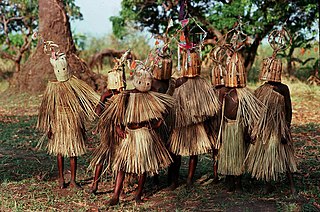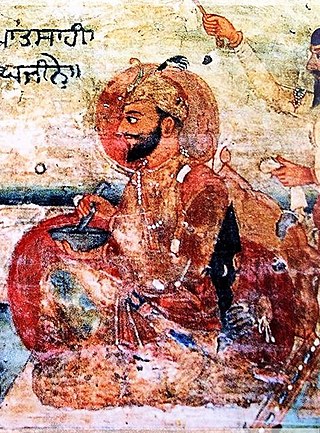Initiation is a rite of passage marking entrance or acceptance into a group or society.
Initiation is a rite of passage marking entrance or acceptance into a group or society.
Coda or CODA may refer to:
Voyager may refer to:

A ritual is a sequence of activities involving gestures, words, actions, or revered objects. Rituals may be prescribed by the traditions of a community, including a religious community. Rituals are characterized, but not defined, by formalism, traditionalism, invariance, rule-governance, sacral symbolism, and performance.

Initiation is a rite of passage marking entrance or acceptance into a group or society. It could also be a formal admission to adulthood in a community or one of its formal components. In an extended sense, it can also signify a transformation in which the initiate is 'reborn' into a new role. Examples of initiation ceremonies might include Christian baptism or confirmation, Jewish bar or bat mitzvah, acceptance into a fraternal organization, secret society or religious order, or graduation from school or recruit training. A person taking the initiation ceremony in traditional rites, such as those depicted in these pictures, is called an initiate.

A rite of passage is a ceremony or ritual of the passage which occurs when an individual leaves one group to enter another. It involves a significant change of status in society. In cultural anthropology the term is the Anglicisation of rite de passage, a French term innovated by the ethnographer Arnold van Gennep in his work Les rites de passage, The Rites of Passage. The term is now fully adopted into anthropology as well as into the literature and popular cultures of many modern languages.
Drive or The Drive may refer to:
Rite may refer to:

Upanayana is a Hindu educational sacrament, one of the traditional saṃskāras or rites of passage that marked the acceptance of a student by a preceptor, such as a guru or acharya, and an individual's initiation into a school in Hinduism. Some traditions consider the ceremony as a spiritual rebirth for the child or future dvija, twice born. It signifies the acquisition of the knowledge of and the start of a new and disciplined life as a brahmāchārya. According to the given community and its regional language, it is also known by numerous terms such as mekhal in Kashmiri (मेखल), janeo in Punjabi (ਜਨੇਓ), jaanoi in Gujrati (જાનોઇ), janya in Sindhi (जन्य), janev in Bhojpuri (जनेव), munja in Marathi (मुंजा), munji in Konkani (मुंजी), poite in Bangla (পৈতৈ), brataghara in Odia (ବ୍ରତଘର), logun dioni in Assamese, bratabandha in Nepali (ब्रतबन्ध), chewar in Newari (छेवार), upanayana in Kannada (ಉಪನಯನ), upanayanamu in Telugu (ఉపనయనము), upanayanam in Malayalam (ഉപനയനമ്), and upanayanam or poonool in Tamil. The Upanayanam ceremony is arguably the most important rite for Brāhmaṇa, Kṣatriya, and Vaiśya males, ensuring his rights with responsibilities and signifying his advent into adulthood.
Babel is a name used in the Hebrew Bible for the city of Babylon and may refer to:

Diksha also spelled diksa, deeksha or deeksa in common usage, translated as a "preparation or consecration for a religious ceremony", is giving of a mantra or an initiation by the guru of Indian religions such as Hinduism, Buddhism, and Jainism. Diksa is given in a one-to-one ceremony, and typically includes the taking on of a serious spiritual discipline. The word is derived from the Sanskrit root dā plus kṣi or alternately from the verb root dīkṣ. When the mind of the guru and the disciple become one, then we say that the disciple has been initiated by the guru. Diksa can be of various types, through the teacher's sight, touch, or word, with the purpose of purifying the disciple or student. Initiation by touch is called sparśa dīkṣā. The bestowing of divine grace through diksa is sometimes called śaktipāt. Another type of diksha, into a monastic order, involves a vow of celibacy, renunciation of all personal possessions and of all worldly duties, including family ties. Diksha has the same meaning in Jainism. Diksha is also called Charitra or Mahanibhiskraman in Jainism. Initiation in Hinduism involves performing one of several rituals depending on the person being initiated and the Hindu group involved.

In anthropology, liminality is the quality of ambiguity or disorientation that occurs in the middle stage of a rite of passage, when participants no longer hold their pre-ritual status but have not yet begun the transition to the status they will hold when the rite is complete. During a rite's liminal stage, participants "stand at the threshold" between their previous way of structuring their identity, time, or community, and a new way.
A demon is a malevolent supernatural being in religion, occultism, mythology, folklore, and fiction.
Equinox commonly refers to:
The Lay Buddhist Ordination refers to the public ordination ceremony wherein a lay follower of Zen Buddhism receives certain Buddhist precepts. The particulars of the ceremony differ widely by country and by school of Buddhism.

Samskara are sacraments in Hinduism and other Indian religions, described in ancient Sanskrit texts, as well as a concept in the karma theory of Indian philosophies. The word literally means "putting together, making perfect, getting ready, to prepare", or "a sacred or sanctifying ceremony" in ancient Sanskrit and Pali texts of India.
Dvija means "twice-born". The concept is premised on the belief that a person is first born physically and at a later date is born for a second time spiritually, usually when he undergoes the rite of passage that initiates him into a school for Vedic studies. The term also refers to members of the three varnas in the traditional Hindu social system, or social classes — the Brahmins, Kshatriyas (warriors), and Vaishyas — whose samskara of the Upanayana initiation was regarded as a second or spiritual birth.
Pwo is a sacred initiation ritual, in which students of traditional navigation in the Caroline Islands in Micronesia become navigators (palu) and are initiated in the associated secrets. Many islanders in the area indicate that this ceremony originated on the island of Pollap, or nearby islands.
Caretaker may refer to:
Night is the period in which the sun is below the horizon.

Amrit Sanskar also called Amrit Parchar, Amrit Sanchar, Khande di Pahul, or Khande Batte di Pahul is one of the four Sikh Sanskaars. The Amrit Sanskar is the initiation rite introduced by Guru Gobind Singh when he founded the Khalsa in 1699.